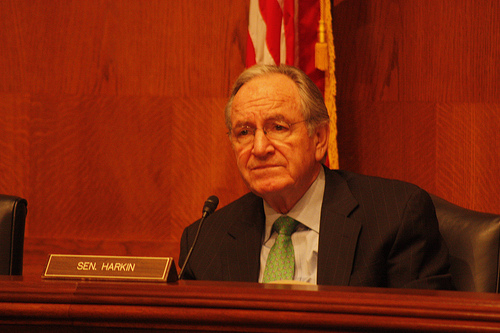


Senator Tom Harkin (D-Iowa), chair of the Committee on Health, Education, Labor and Pensions and author of the new report, Unfinished Business: Making Employment of People with Disabilities a National Priority.
Senator Tom Harkin (D-Iowa) is using his position as Chair of the U.S. Senate Committee on Health, Education, Labor and Pensions (HELP) to lobby public officials and leaders of private industry to set goals for job training, recruiting, and employment of people with disabilities.
On Monday, Harkin’s office published Unfinished Business: Making Employment of People with Disabilities a National Priority. The 39-page report (available on the Senator’s website as a PDF file) stems from a series of the HELP committee hearings that examined various causes for low workforce participation by this population, and outlines a number of strategies and tactics that will lead to the goal of “competitive, integrated employment” for individuals with disabilities.
Harkin’s report makes the case that time is ripe for such an approach because the current generation has grown up under the umbrella of the 1975 Individuals with Disabilities Education Act (IDEA) and the 1990 Americans with Disabilities Act (ADA). The improved access to transportation, telecommunication, education, and workplace accommodations provided by these laws has wrought what Harkin calls “the ADA generation,” and he is confident in the ability of these young individuals to succeed:
This generation knows that being employed is part of being and adult, being responsible and being a contributing participant in the American way of life. Being employed has important fiscal, psychological, physiological, societal, and even spiritual benefits… [W]ork [provides] individuals with a sense of self-worth and allows them to contribute to society; through the direct work they do; through paying taxes, and through charitable contributions.
On the same day the report was released, The Huffington Post published an op-ed by Harkin entitled, “Disability Employment: Are We at the Tipping Point?” Despite the dismal employment statistics for people with disabilities, Harkin writes he is optimistic that the country is “on the verge of making substantial gains in this area,” again citing the ADA generation’s achievement-oriented disposition and several public and private sector initiatives, including the federal government’s goals to hire 100,000 workers with disabilities by 2015, the Department of Labor’s proposed rule for encouraging federal contractors to document recruitment efforts within this population, and Delaware Governor Jack Markell’s “A Better Bottom Line: Employing People with Disabilities” initiative as chair of the National Governor’s Association, which was just announced on Sunday.
Both the Harkin and Markell reports draw deep inspiration from the CEO summit they attended in June at the Walgreens distribution center in Windsor, Connecticut. Harkin’s HuffPo column praises the leadership of several companies he heard from at that conference for “setting ambitious goals” for employment of individuals with disabilities; it also serves as a basis for some of the tangible benefits for companies described in “Unfinished Business.” Harkin writes:
… [E]vidence suggests that, with a well-designed plan for an inclusive workforce, employers suffer no loss in productivity and workers are no less safe. In fact, there is some evidence an inclusive workforce increases the retention rate of employees and the employees with disabilities have lower medical treatment costs.
Where do you think the greatest progress can be made increasing employing for people with disabilities? Share in the comments section below.
Image by Ryan J. Reilly, used under its Creative Commons license.